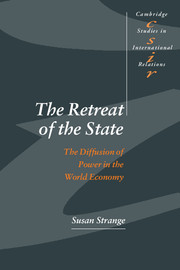Book contents
- Frontmatter
- Contents
- Preface
- Part I Theoretical foundations
- Part II Some empirical evidence
- 6 Authority beyond the state
- 7 Telecoms: the control of communication
- 8 Organised crime: the mafias
- 9 Insurance business: the risk managers
- 10 The Big Six accountants
- 11 Cartels and private protectionism
- 12 International organisations: the econocrats
- Part III Conclusions
- References
- Index
- CAMBRIDGE STUDIES IN INTERNATIONAL RELATIONS
12 - International organisations: the econocrats
from Part II - Some empirical evidence
Published online by Cambridge University Press: 07 October 2009
- Frontmatter
- Contents
- Preface
- Part I Theoretical foundations
- Part II Some empirical evidence
- 6 Authority beyond the state
- 7 Telecoms: the control of communication
- 8 Organised crime: the mafias
- 9 Insurance business: the risk managers
- 10 The Big Six accountants
- 11 Cartels and private protectionism
- 12 International organisations: the econocrats
- Part III Conclusions
- References
- Index
- CAMBRIDGE STUDIES IN INTERNATIONAL RELATIONS
Summary
One of the three hypothetical propositions in this book was that power had moved in recent times from the nation-states to international organisations. Some authority over some issues had shifted upward, as it were, from national capitals and their political institutions, to the scattered headquarters of international bureaucracies. International organisations – IGOs or intergovernmental organisations – are certainly more numerous and more visible than they were a generation or more ago. The annual meetings of the World Bank and the International Monetary Fund draw literally thousands of journalists every year. Their readers no longer have to be told what these bodies are; ‘IMF’ is already in the translingual, global vocabulary, along with STOP, Fax or Coca-Cola. But visibility and familiarity are not the same as authority. How much power do the worldly bureaucrats really exercise over outcomes in world economy and society?
And even if the evidence shows that they do have authority, there is a second and even more important question. On whose behalf is that authority used? For there are two alternative interpretations. One, dear to liberal internationalists and neo-functionalists in academic circles, is that this nascent authority is the embryo of supranational government, exercised in the interests of the world community. For all its frustrations and all its shortcomings, this shift from national to supranational authority is seen as the first glimmer of dawn after a long dark night. Recall, though, that the same liberal internationalists have been guilty of wishful thinking before.
- Type
- Chapter
- Information
- The Retreat of the StateThe Diffusion of Power in the World Economy, pp. 161 - 180Publisher: Cambridge University PressPrint publication year: 1996

